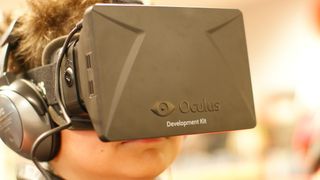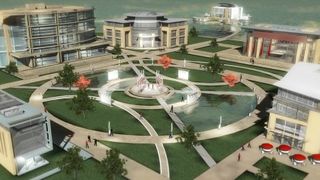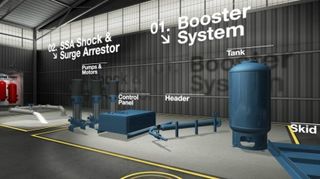Five incredible ways Oculus Rift will go beyond gaming
From medicine to military applications

When you think of virtual reality, you think of games. You imagine yourself running around a Tron-like rendition of the real world, participating in a massive game of laser tag, shooting your friends in the face without any consequences.
Of course, that's precisely what the Oculus Rift was designed for, with its note-perfect balance of affordable hardware and the cutting edge. And yet, the most exciting innovations going on aren't anything to do with kill/death ratios, gruff dudes shooting aliens or Tron.
With Facebook sealing the deal to acquire Oculus VR this week, the implications for virtual reality beyond gaming are more in mind than ever. Here, TechRadar takes a look at the most exciting and intriguing non-gaming applications of virtual reality.
1. Architecture
Jon Brouchoud first plied his trade in architecture and is now the creator of Arch Virtual, specialists in creating 3D environments specifically with virtual and augmented reality in mind.
"We discovered this whole ecosystem around virtual reality: businesses, schools, government and military applications," he says. Ever since then, Brouchoud has been working exclusively within VR.

Arch Virtual now deals with real estate, architectural planning, healthcare simulation modelling, virtual campuses, automotive manufacture and urban planning. In some senses, virtual reality has allowed the firm to fully realise its tagline: "anything you can imagine".
Prior to the Oculus Rift, Arch Virtual mostly operated with Unity-based web applications. "There wasn't any hardware worth looking into," says Brouchoud. But from the second it hit Kickstarter, Brouchoud jumped straight in. "I knew this was going to change architecture forever".
Get daily insight, inspiration and deals in your inbox
Get the hottest deals available in your inbox plus news, reviews, opinion, analysis and more from the TechRadar team.
For Wessels, manufacturer of pressure tanks, Brouchoud designed a virtual warehouse for use at trade shows. "They make these huge pieces of equipment that are difficult to transport, sometimes one or two storeys tall," he tells us.

"A virtual reality experience enables people to feel as if they're standing in their warehouse. Nothing else can quite leave that impression."
Brouchoud envisions a VR future in which architecture can be altered in real time, allowing for a unique, bespoke experience not dissimilar to that seen in Christopher Nolan's Inception: "The holy grail is that architectures and designers will be able to create in an iterative way, within the building. Making decisions, reaching out and moving walls in real time."
"You can almost conceptually imagine a time when the architecture is literally perfect, crystallised around exactly the way we're going to use the building," he adds. "Rather than this abstract blueprint realisation process, the buildings will fit like a glove."
Check out more about Arch Virtual here.
2. Education and autism
Mathieu Marunczyn is both ICT leader and a teacher at the Jackson School in Victoria, Australia. At the forefront of gamifying education, Mathieu's introduced Minecraftand Leap Motion to the classroom, and is now working with the Oculus Rift.
"We've been exploring its applications in special needs education, working with the programs and software that are freely available and seeing how kids respond," he tells TechRadar. "Primarily I've been looking at its potential for kids who have sensory processing disorders."
In conjunction with the school's Autism Spectrum Disorder Specialist Naserah Khan, Marunczyn has used Oculus titles SpaceWalkand Blue Marble for their predictability, limited motion, and the fact they're generally not over-stimulating.
The initial use of the Oculus has shown that kids are really keen to use it, regardless of age or disability. It's been really conducive to small sharing groups. For example, kids working together in SpaceWalk talking about their experience, making up space stories.
Not being a developer means Marunczyn has had to work with what's currently available, with educational resources as a strict premium.
"I'd really like to keep exploring the meditative and calming aspects of VR for kids with autism and other disabilities," he says.
"I think role-play environments also have a lot of potential for kids with anxiety issues and autism because you could build something and have them guided through the initial experience and what to expect."
- 1
- 2
Current page: Architecture and education
Next Page From 3D design to post-traumatic stress treatmentMost Popular
